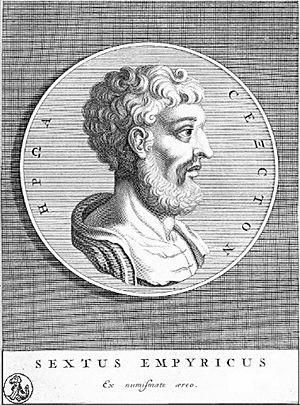Sextus Empiricus facts for kids
Quick facts for kids
Sextus Empiricus
|
|
|---|---|
 |
|
| Born | Second century AD |
| Died | Late 2nd century or early 3rd century possibly in Alexandria or Rome
|
|
Notable work
|
|
| Era | Hellenistic philosophy |
| Region | Western philosophy |
| School | Pyrrhonism Empiric school |
|
Main interests
|
Skepticism |
|
Influences
|
|
|
Influenced
|
|
Sextus Empiricus was an important Greek philosopher and physician. He lived around the 2nd century AD. He was known for his ideas on Pyrrhonism, a type of skepticism.
Sextus Empiricus's writings are the best source we have today about ancient Greek and Roman Pyrrhonism. His works also tell us a lot about other ancient philosophies because he often argued against them.
Contents
Who Was Sextus Empiricus?
Not much is known about Sextus Empiricus's life. He probably lived in cities like Alexandria, Rome, or Athens. His Roman name, Sextus, suggests he was a Roman citizen.
He was also a doctor and was linked to the Empiric school of medicine. This school was popular among Pyrrhonist thinkers. However, in his own writings, Sextus sometimes seemed to favor the Methodic school of medicine more.
What Was His Philosophy?
Sextus Empiricus was a skeptic. This means he questioned many things that people thought they knew for sure. He believed we should be careful about claiming to know the absolute truth.
Doubting Knowledge
Sextus raised questions about how we gain knowledge. He wondered if we can truly know things by looking at patterns. For example, if the sun rises every day, can we be 100% sure it will rise tomorrow? He thought we couldn't.
He also questioned how we decide if something is true. He asked:
If someone says they can judge what is true, they must have a way to do it. Is this way of judging approved by someone else, or not? If it's not approved, how can we trust it? If it is approved, then the thing that approved it also needs to be approved, and so on forever.
This idea shows that it's hard to find a perfect starting point for all knowledge.
Pyrrhonian Skepticism
Sextus's ideas are called Pyrrhonian skepticism. He believed that instead of saying something is true or false, we should simply stop making a judgment. This is called epoché, or "suspending judgment."
By suspending judgment, Sextus thought we could reach a state of ataraxia. This means having a peaceful mind, free from worry. If you don't claim to know everything, you won't be upset when things don't turn out as you expected.
Some experts believe Sextus thought we should suspend judgment about almost everything. They say we can live by habit without needing to believe things are true or false. Other experts think Sextus allowed for some beliefs, as long as they weren't based on deep philosophical thinking. For example, a skeptic might accept common ideas in their society. The main difference is that a skeptic doesn't hold beliefs as a result of strict philosophical proof.
What Did He Write?
Sextus Empiricus wrote many books. We know of three main works that have survived:
- Outlines of Pyrrhonism (Pyrrhōneioi hypotypōseis)
- Adversus Mathematicos (Against Those in the Disciplines or Against the Mathematicians)
Adversus Mathematicos is a very long work. It includes several books that are often called Against the Professors. These books argue against different types of teachers and their ideas:
| Book | What it's about |
|---|---|
| I | Against Grammarians (people who study language) |
| II | Against Rhetoricians (people who teach public speaking) |
| III | Against Geometers (people who study shapes and spaces) |
| IV | Against Arithmeticians (people who study numbers) |
| V | Against Astrologers (people who believe stars affect our lives) |
| VI | Against Musicians (people who study music theory) |
Another part of Adversus Mathematicos is sometimes called Against the Dogmatists. These books argue against philosophers who claim to know certain truths:
| Book | What it's about |
|---|---|
| VII–VIII | Against Logicians (people who study reasoning) |
| IX–X | Against Physicists (people who study the natural world) |
| XI | Against Ethicists (people who study right and wrong) |
How Did He Influence Others?
Sextus Empiricus's ideas became very important in Europe during the 1500s, 1600s, and 1700s. His book Outlines of Pyrrhonism was translated into Latin and read by many thinkers.
He had a big impact on famous philosophers like Michel de Montaigne, David Hume, and Georg Wilhelm Friedrich Hegel. His ideas helped shape how people thought about knowledge and doubt for centuries. Even today, his work is studied by those interested in philosophical skepticism.
See also
 In Spanish: Sexto Empírico para niños
In Spanish: Sexto Empírico para niños
- Philosophical skepticism
- Protagoras
- Dissoi Logoi
 | Delilah Pierce |
 | Gordon Parks |
 | Augusta Savage |
 | Charles Ethan Porter |

